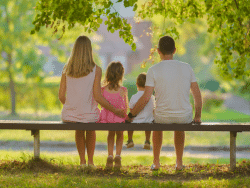When Should Someone Seek Grief Counseling?
When faced with moving on and living life after someone close to you has died, there are so many emotions going through you at different times. Dealing with grief is such a personal endeavor, family and friends can only scratch the surface of consoling someone who is grieving.
Sometimes, we wonder if we should be done grieving and if we’re ever going to be able to move on. Do we need to get counseling for our grief?
Do I Need Grief Counseling?
As we go through grief, it is sometimes easy to miss the signs telling us we need to seek out help. Whether you are considering getting help for yourself or a friend that seems to be struggling after the death of a loved one, consider these points to see how many you can relate to.
- Inability to Stop Crying – This is certainly one of the most apparent traits that friends can see, understanding you’re still overcome with sadness.
- Significant Weight Loss – Weight loss could mean the person is not eating and getting proper nutrition and their body is burning off stored calories. This is dangerous because it could lead to other health issues.
- Inability to Concentrate – Moving on means being able to compartmentalize your moments of grief. You’ll always feel sad about your loss and miss your loved one, but you are still alive, and you need to be able to choose when to think about them.
- Change in Sleeping Patterns – You’re eventually going to be able to sleep, even if it’s after crying yourself to sleep. But if you find yourself sleeping during the day and staying awake all night, that’s a sign your mind is struggling to handle this on its own.
- You’re Having Suicidal Thoughts or Thoughts of Hurting Yourself – Without question, this is the most important point, as some people reason they can’t go on living without their loved one. Rational thought, though, would help them understand that their loved one would never wish them to do that, and they’d want them to continue living.
- Uncontrollable Rage – After the initial moments of losing a loved one, we should be able to lessen our anger toward the loss as time goes by. Uncontrollable rage will just open up opportunities for more trouble, so counseling is definitely needed.
- Others Have Mentioned You Need Grief Counseling – If other people have already brought this subject up, then they’re seeing some signals that a professional therapist might be necessary to help you move on.
When to See a Grief Counselor?
Predicting how we’d feel after the loss of a loved one is impossible. We don’t know how low it will take us to go through the stages of grief, and how badly this loss will affect us, or not. This makes it difficult to pinpoint the right time to see a grief counselor. However, there are certain things you need to consider when seeking assistance.
You Lost Your Identity
For example, if you start believing you’ve lost your sense of identity. This is very common when your loved one used to take care of many things. Those who lose a partner experience this often, whether it was one partner that took care of the finances, while the other one took care of the house, navigating life without that guidance can be troublesome. Seeking help from the beginning of your loss can help you find your normal life once again.
You’re Scared
Of hurting yourself or others. It’s very common to experience rage and resentment against others, particularly when the cause of death was due to illness or an accident. In this case, we might jump to the angry phase of grieving almost instantly. Managing and understanding this irrational anger can be difficult. A counselor can help you process this anger and help you remain calm.
You Feel Alone
Not everyone within your family or social circle will process grief as you do. If at any point, you start feeling alone, reaching for a grief counselor can help you navigate through your feelings. You don’t even have to talk about your feelings, just having someone’s supportive presence will be helpful.
You Have Children
Trying to explain a funeral to children is a difficult task. Let alone, trying to process grief with children. If this is the case, the sooner you seek a grief counselor, the better. Not only will you get the tools you need to break the news and explain what’s happening to your children, but you will also have a space to process the information by yourself.
In the end, no one can tell you when to seek grief counseling. Only you can tell when you’re ready to find help and if you need help. When you’re ready, our expert counselors are available to help you navigate through these difficult moments.
Websites to Help With Grief
While most adults understand that death happens to be a part of life, logic doesn’t always help our hearts overcome grief. Time helps heal all wounds, of course, but many of us need help immediately.
Many times, just acknowledging that grief is difficult and knowing the effects are debilitating isn’t enough to help people. Whether the grief comes from loss of life, loss of a relationship or the trauma of a major injury or illness, it can affect someone for days, weeks, months or even years, causing many issues in other parts of their own life.
We tracked down some helpful websites for dealing with grief that offer different resources, allowing people to move past their struggles with loss and their feelings of abandonment.
3 Great Websites for Helping You Deal with Grief
Dealing with grief alone can be difficult, but these websites work to help you.
This is a super helpful resource to use when grieving because they offer plenty of helpful articles on the many steps of grief, but they also help explain different ways loved ones can help those that are grieving.
One of the most interesting tools in the Grief Toolbox is art. They explain that creating art can help people express their feelings and thoughts in a healthy way. It’s also helpful to simply look at the artwork—it lets those grieving see that they aren’t the only ones who have dealt with this.
This site offers several coping strategies to help work your way through the grieving process. These coping strategies help people learn what physical care they can do, along with what personal priorities people should make, what social support you need, and what kind of spiritual comfort to look for. They also sell a grief guidebook that provides effective and comfortable ways to survive all the stages of grief.
This site helps people find therapists, but this article lists 10 websites that can help with grief or loss. It’s like a directory for quality websites that can help grieving people, and the many different ways that grief can be manifested.
The Gardens of Boca Raton Cemetery & Funeral Services serves the South Florida area, including those in Broward, Dade and Palm Beach Counties. Call their offices at (561) 989-9190, or visit them in Boca Raton, to ask for more resources to help cope with grief.ust acknowledging that grief is difficult and knowing the effects are debilitating isn’t enough to help people. Whether the grief comes from loss of life, loss of a relationship or the trauma of a major injury or illness, it can affect someone for days, weeks, months or even years, causing many issues in other parts of their own life.



